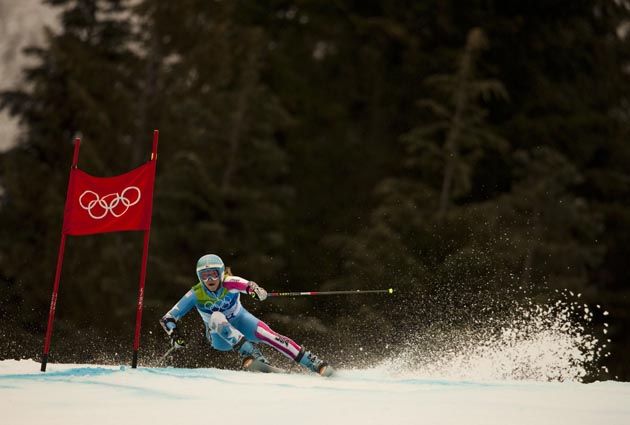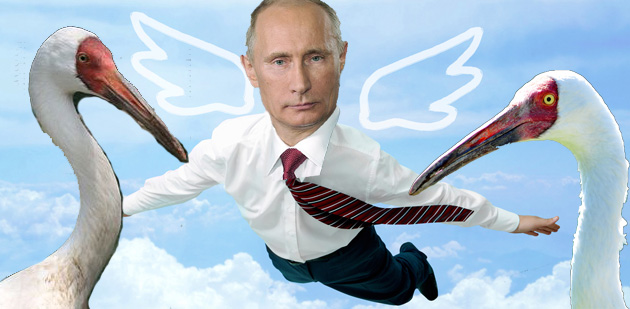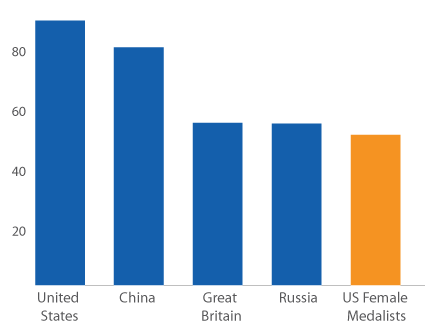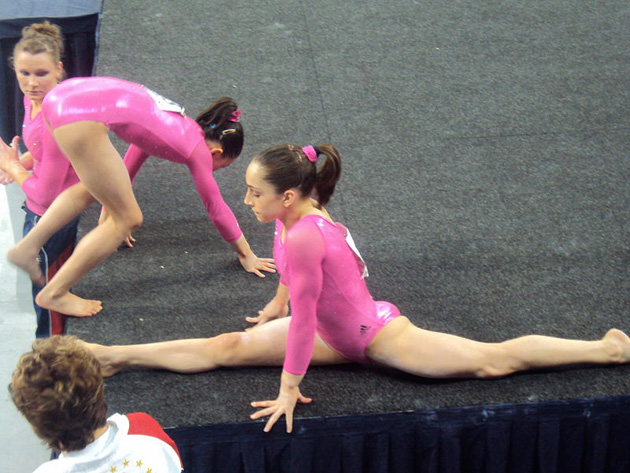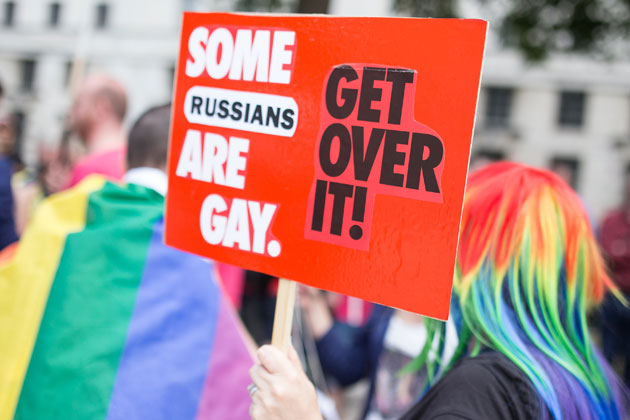
Londoners protest Russia's anti-gay law in August.Joel Goodman/London News Pictures/ZUMA
Click here to jump straight to the latest news updates.
Saddled with allegations of forced evictions, labor rights abuses, graft, and corruption—along with an estimated record price tag of $50 billion—the 2014 Winter Olympics in Sochi, Russia, have been the source of international outrage for some time now. But when Russia’s Interior Ministry announced last week that the country’s so-called anti-gay law—which allows for fining and detaining gay and pro-gay people—would apply during the Games, gay rights and human rights activists around the world turned their focus to the small city on the coast of the Black Sea, one of the warmest corners of Russia.
We put together this backgrounder to help catch you up to speed on all things Sochi:
What’s the deal with Russia’s anti-gay law? Since President Vladimir Putin signed the new legislation—which passed the Duma with a 436-0 vote—on June 30, there’s been a steady stream of reporting on what this law means for the Russian people. In short, Article 6.21 of the Code of the Russian Federation on Administrative Offenses allows the government to fine people accused of spreading “propaganda of nontraditional sexual relations amongst minors” between 4,000 and 1 million rubles ($120 to $30,000). A law passed in 2012 also bans gay-pride events in Moscow for the next 100 years.
Recent attempts at gay-pride events have deteriorated into violence:
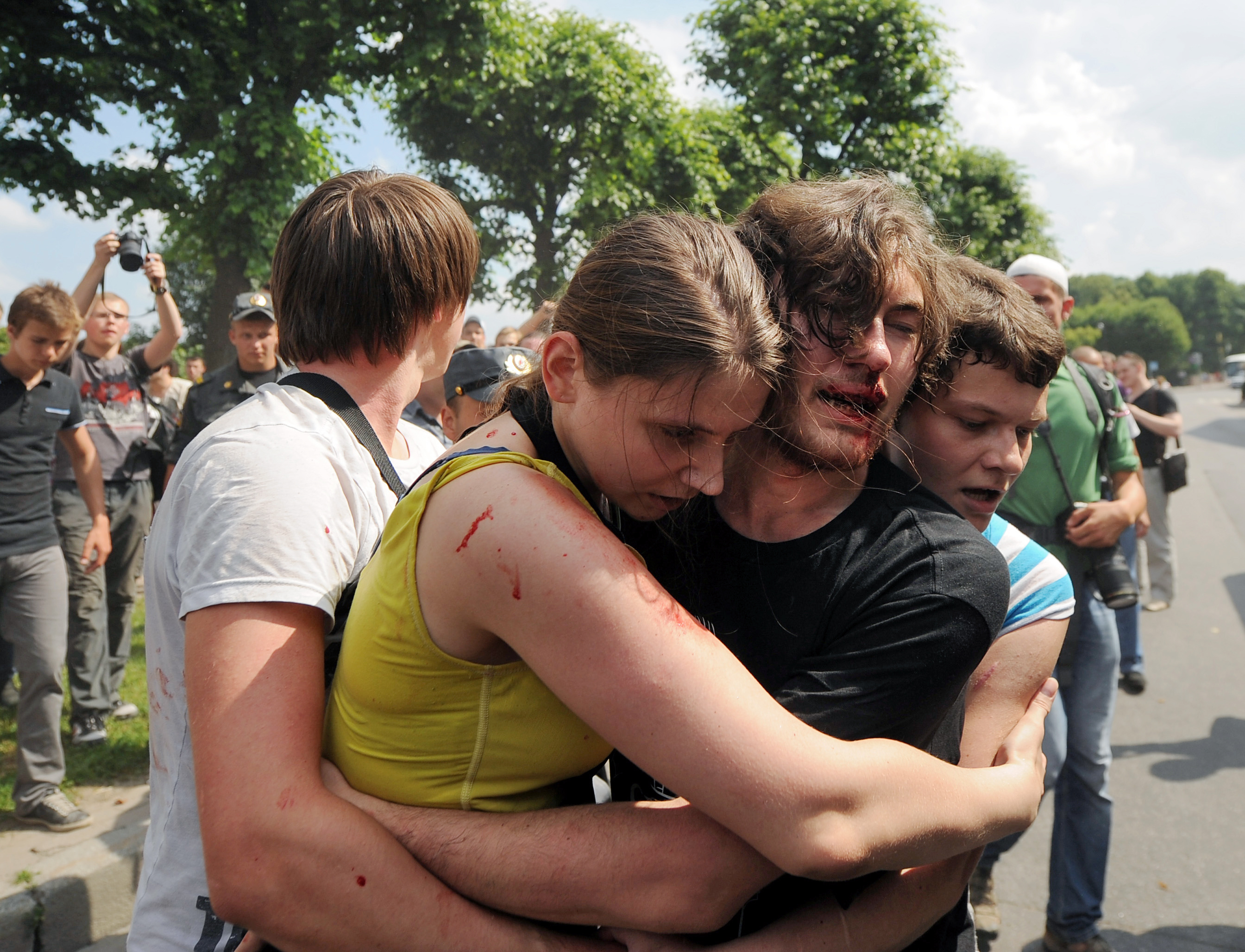
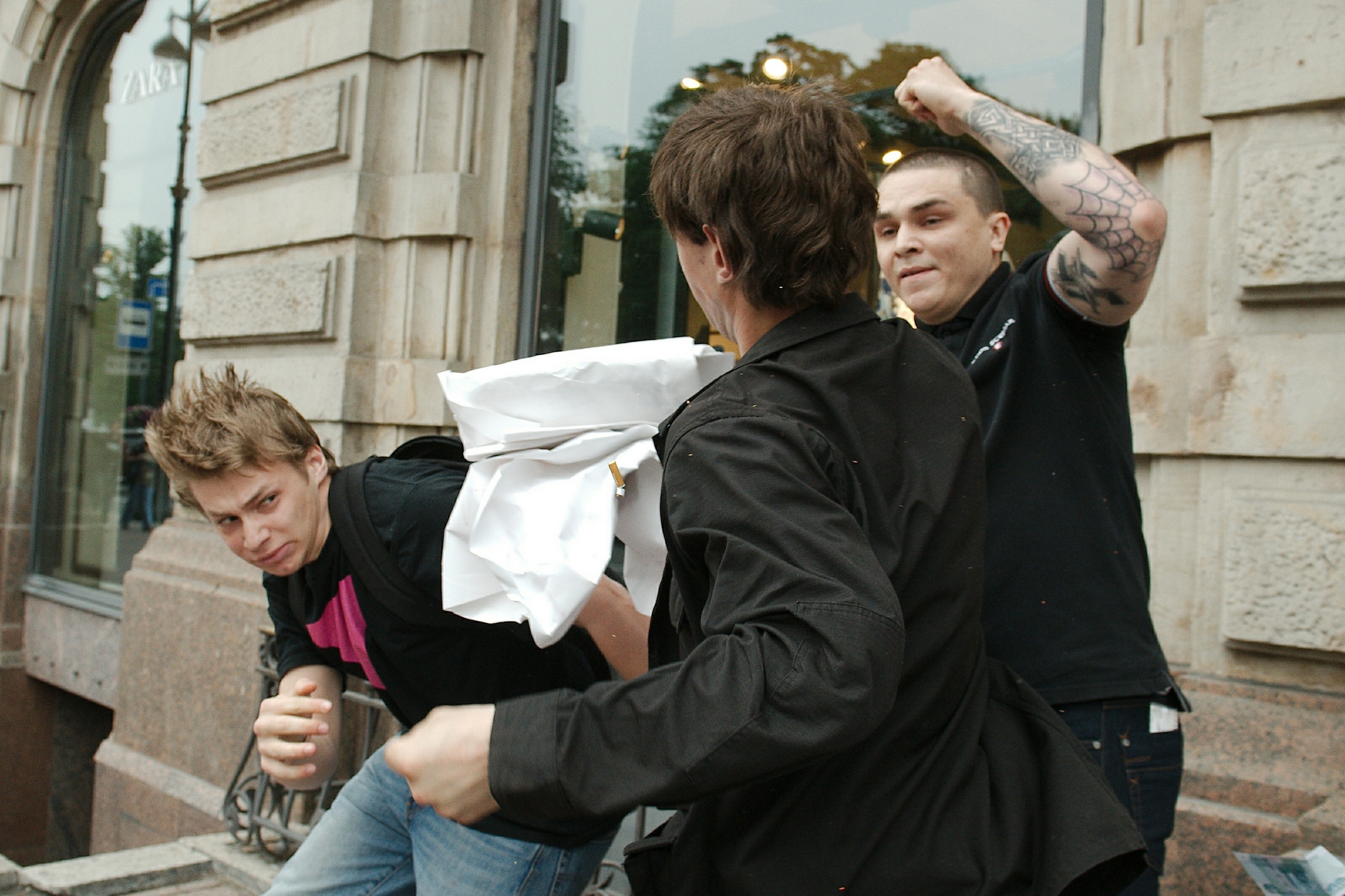
Last weekend, Russian American journalist Masha Gessen—who started Russia’s pink-triangle campaign for LGBT acceptance—published a gut-wrenching account in the Guardian of her own decision to move her girlfriend and children back to the United States after years living in Russia. “In June, the ‘homosexual propaganda’ bill became federal law,” she wrote. “The head of the parliamentary committee on the family pledged to create a mechanism for removing children from same-sex families.
“Two things happened to me the same month: I was beaten up in front of parliament for the first time and I realized that in all my interactions, including professional ones, I no longer felt I was perceived as a journalist first: I am now a person with a pink triangle.”
What are some other tactics anti-gay activists are using in Russia? Though anti-gay actions and sentiment have been brewing for years—this federal rule comes on the heels of several similar regional laws, which have been enacted in St. Petersburg and other cities since 2006—this law has taken it to new heights: In July, the Spectrum Human Rights Alliance (SHRA), a US-based organization that advocates LGBT rights in Eastern Europe, helped bring international attention to a Russian group called Occupy Pedophilia. Led by notorious Russian neo-Nazi Maksim “Tesak” (“the Hatchet”) Martsinkevich, the group has been using social media, primarily VKontakte (Russia’s Facebook spinoff), to place fake dating ads to lure gay men. Once face-to-face with the men, group members interrogate and torture them, and a video of the encounter is put on YouTube. Here’s one such video from late July. (Warning: The content of the video is disturbing.)
Some of the videos are also placed on the group’s website, where victims are categorized by sexual orientation and users can rate the videos. As of this writing, Occupy Pedophilia has nearly 450 regional chapters listed on VKontakte.
Larry Poltavtsev, president and founder of SHRA, explains that months ago, Martsinkevich released a video declaring his own special plan for ending gay-pride events in Russia. Though it disappeared for a while, Poltavtsev says, it recently reappeared on YouTube (see below). In it, a shirtless Martsinkevich says this is his first time directly addressing the Moscow government. He explains that it’s a shame the government must sink so many resources into its gay-pride ban—dealing with civil rights lawsuits, paying out compensation, and the like. Instead, he suggests, why not simply make gay-pride events legal—but leave them without security or police presence? “This will be the first and last time,” Martsinkevich concludes, “that homosexuals will try to hold their parade in Russia.”
Poltavtsev also mounted a petition on Change.org to add Russian lawmakers Vitaly Milonov and Elena Mizulina, both of whom have sponsored anti-gay legislation, to the US Congress’ Magnitsky list of human rights violators. It currently has more than 11,000 signatures.
Meanwhile, an April 2012 TV appearance by Dmitri Kiselev—TV anchor and deputy director of VGTRK, Russia’s state-owned television and radio holding company—surfaced last week, showing Kiselev, a state employee, saying the following to a round of applause: “I think that just imposing fines on gays for homosexual propaganda among teenagers is not enough. They should be banned from donating blood, sperm. And their hearts, in case of the automobile accident, should be buried in the ground or burned as unsuitable for the continuation of life.”
In an interview this week on Moscow radio station Echo of Moscow, Kiselev defended his remarks, explaining that, to his knowledge, these practices are already employed in other Western countries, including the United States. (He cited the US Food and Drug Administration as a source.)
Will the law apply during the Sochi Olympics? The lengthy back-and-forth on this question has been convoluted—and still hasn’t led to a conclusive decision. Here’s a breakdown of how it has transpired thus far:
(1) In late July, the International Olympic Committee (IOC) assured the public that Russia’s latest anti-gay law would not be enforced during the Olympics.
(2) A few days later, Sports Minister Vitaly Mutko contradicted this point in an interview with R-Sport, the sports wire of state news outlet RIA Novosti, saying: “An athlete of nontraditional sexual orientation isn’t banned from coming to Sochi…But if he goes out into the streets and starts to propagandize, then of course he will be held accountable.”
(3) A week later, Mutko reversed course on his own statement, telling everyone to please “calm down,” that this was a sports forum where only sports need be addressed, and to “rest assured that all the athletes and all the sports organizations should be relaxed.”
(4) On Monday, Russia’s Interior Ministry confirmed that the law would, in fact, be enforced during the Winter Olympics. But Alexander Zhukov, head of Russia’s National Olympic Committee, clarified that LGBT athletes could take part in the games without fear for their safety, provided they didn’t promote their views or lifestyles to minors—an action that the law defines vaguely.
How could this law affect people at the Games? If fully enforced at the Olympics, this law could certainly be used against athletes and spectators alike. A specific provision of the law specifies that gay or pro-gay foreigners can be jailed for up to 14 days before being booted from the country. Then again, it has been widely noted that the “spreading propaganda to minors” provision of the law is incredibly vague, leading the IOC and FIFA, whose 2018 World Cup is scheduled to be in Russia, to ask for clarification on the law from the Putin administration.
That said, there’s no mention of any of that on the Winter Games’ official website. In fact, the most recent press release on Sochi2014.com, from June 27, is titled, “Sochi 2014 Organizing Committee’s Dmitry Chernyshenko Says Hotels Meet IOC Demand.” So there’s that.
How has the rest of the international community—including athletes—responded? Actor Harvey Fierstein wrote a New York Times op-ed in July urging the International Olympic Committee (IOC) to “demand the retraction of these laws under threat of boycott.” He then took it a step further, highlighting the lack of a boycott the 1936 Summer Games in Berlin: “Supporters of that decision point proudly to the triumph of Jesse Owens, while I point with dread to the Holocaust and world war. There is a price for tolerating intolerance.”
Fierstein’s opinion, though, seems to be in the minority. Dan Savage, of “It Gets Better” fame, has argued that a protest in Sochi would be more effective than a boycott. (Although he has called for a boycott of Russian vodka.) The Nation‘s Dave Zirin touched on this debate for Grantland, even reaching out to John Carlos, coauthor of the most famous Olympic protest ever. “If you stay home,” Carlos said, “your message stays home with you…To be heard is to be greater than a boycott. Had we stayed home, we’d never have been heard from again.”
Several big-name gay former Olympians—including diver Greg Louganis and figure skater Johnny Weir—agree with Carlos. The US Olympic Committee released a statement in strong opposition to a potential boycott, saying, “If there are any lessons to be learned from the American boycott of 1980, it is that Olympic boycotts do not work.”
And last week, President Obama said at a White House news conference that he also opposes a boycott, adding, “One of the things I’m really looking forward to is maybe some gay and lesbian athletes bringing home the gold or silver or bronze, which I think would go a long way in rejecting the kind of attitudes that we’re seeing there.”
What do corporate sponsors have to say about all this? BuzzFeed‘s Chris Geidner and Sapna Maheshwari got in touch with the 10 major Olympic sponsors, whose spokesmen had little to add to the IOC’s statement. Still, a General Electric spokeswoman told the reporters, “We expect the IOC to uphold human rights in every aspect of the Games.”
Meanwhile, NBC (formerly part-owned by GE), which paid the IOC $775 million for Sochi broadcast rights, has taken heat from Media Matters and others for parroting he IOC line and not reporting on the anti-gay law.
What about the petition urging the IOC to move the Olympics from Sochi to Vancouver? That petition, which now has more than 100,000 signatures, has been pushed by actor and gay rights activist George “Mr. Sulu” Takei, who told PRI’s The World last week that a regular boycott wouldn’t work “because it would be grossly unfair to the athletes.” He continued:
We think the best solution is to take it out of Russia and ensure the safety of the athletes and their supporters and put it in Vancouver, which is the most feasible of all the various venues. The sponsors will follow the Olympics to where it is.
Vancouver, as you might remember, hosted the 2010 Winter Olympics to rave reviews. But even if the IOC were inclined to move the Games (it’s not), there’s the little issue of feasibility. As one Vancouver city council member told CBC News, “I can understand the intention, but practically, I don’t see how it could happen.”
UPDATE, Friday, August 16, 9:47 a.m. PDT (Ian Gordon): Days after American middle-distance runner Nick Symmonds criticized the anti-gay law after winning a silver medal in the 800-meter final of the IAAF track championships in Moscow, USOC exec Scott Blackmun told Russia’s R-Sport that “it’s our strong desire that our athletes comply with the laws of every nation that we visit. This law is no different.”
Also, The Colbert Report weighs in on the international response:
UPDATE 2, Sunday, August 18, 9:58 p.m. PDT (Ian Gordon): In protest of the anti-gay law, Russian sprinters Kseniya Ryzhova and Tatyana Firov kissed on the medal stand yesterday after taking part in the gold-winning 4×400-meter relay team at the IAAF track championships. Will the protest momentum carry all the way to Sochi in February?
UPDATE 3, Monday, August 19, 1:18 p.m. PDT (Ian Gordon): So, about that medal stand protest…
Kseniya Ryzhova told the Guardian today that she and Tatyana Firov weren’t taking a stand for LGBT rights when they smooched after their winning relay race over the weekend. “It was just happiness for our team,” she said.
Also: “If people want to write all sorts of dirt about us, they should at least know that Yulia and I are both married.” Well, then.
UPDATE 4, Friday, August 23, 10:11 a.m. PDT (Ian Gordon): In a letter to the IOC, Russia’s deputy prime minister sought to reassure the international community that Russia would comply with the Olympics’ anti-discrimination provision. But Dmitry Kozak defended the anti-gay law, claiming, “These legislations apply equally to all persons, irrespective of their race, religion, gender, or sexual orientation, and cannot be regarded as discrimination based on sexual orientation.”
In a statement, IOC president Jacques Rogge said, “We have today received strong written reassurances from the Russian government that everyone will be welcome at the games in Sochi regardless of their sexual orientation.”
UPDATE 5, Friday, August 23, 10:16 a.m. PDT (Ian Gordon): Planning on going to Sochi to protest the anti-gay law right around the Olympics? You might want to rethink that.
The Rossiyskaya Gazeta, the official government newspaper, published the presidential decree Friday, listing an array of measures tightening security in the Olympic host city, including the ban on public assemblies. All “gatherings, rallies, demonstrations, marches and pickets” that are not part of the Olympics or the Paralympics will be prohibited in Sochi from Jan. 7 to March 21, the decree said.
…
Among other measures in the decree were restrictions on vehicles entering Sochi. Only cars with local license plates, emergency vehicles and those accredited by the Olympic organizers will be allowed to enter the host city between Jan. 7 and March 21.
UPDATE 6, Thursday, August 29, 2:56 p.m. PDT (Eric Wuestewald): Earlier today, the Human Rights Campaign released a letter calling on the Games’ major financial sponsors to denounce the anti-gay law. Addressing the CEOs of Dow Chemical, Coca Cola, General Electric, McDonalds, Proctor & Gamble, Panasonic, Samsung, Omega, Visa, and Atos, HRC president Chad Griffin outlined a series of steps to publicly condemn the law and all violence associated with it:
1. Adopt a clear and unequivocal public position in opposition to anti-LGBT laws like the one adopted by the Russian government.
2. Denounce targeted violence against LGBT people in Russia and demand investigation and accountability from Russian authorities.
3. Ask the IOC to obtain concrete, written commitments from the Russian government about the safety of international Olympic athletes and attendees—and urge the IOC to reject future Olympic bids from countries with laws that outlaw support for LGBT equality.
4. Affirm unequivocable support for non-discrimination and equality, and ensure that policies and practices reflect this commitment.
5. Put marketing and creative advertising resources to use–helping to build awareness and demonstrate support for LGBT equality in Russia and globally.
6. Support the local LGBT community in Russia.
“There is a shadow over the 2014 Olympic Games,” writes Griffin, “a shadow generated by documented hate-based violence against lesbian, gay, bisexual, and transgender (LGBT) people in Russia.”
Despite calls for the IOC to explicitly oppose the law, the apolitical body doesn’t seem likely to sway since the Olympic Charter expressly forbids any “demonstrations or political, religious, or racial propaganda” throughout the games. During the 1968 Olympics in Mexico City, when track stars Tommie Smith and John Carlos tested this rule with the now famous silent fist salute, both athletes were permanently expelled from the event.
UPDATE 7, Friday, September 6, 12:00 p.m. PDT (Hannah Levintova): Earlier this week, Russian lawmaker Alexei Zhuravlev proposed a bill that, if passed, could deny the nation’s gay parents custody of their kids. The filing of the bill—which gay activists have long anticipated—was posted to the Duma website on Thursday, and coincided with the G20 summit in St. Petersburg and an Associated Press interview with President Putin where he denied that Russia has laws that discriminate against gay people.
Before heading back to the US earlier today, President Obama met with nine gay rights activists at a hotel meeting room, accompanied by US ambassador to Russia Michael McFaul and national security adviser Susan Rice. Obama said that he is offended by the law, and called the advocates’ work “critically important” in helping to “strengthen Russian society.”


